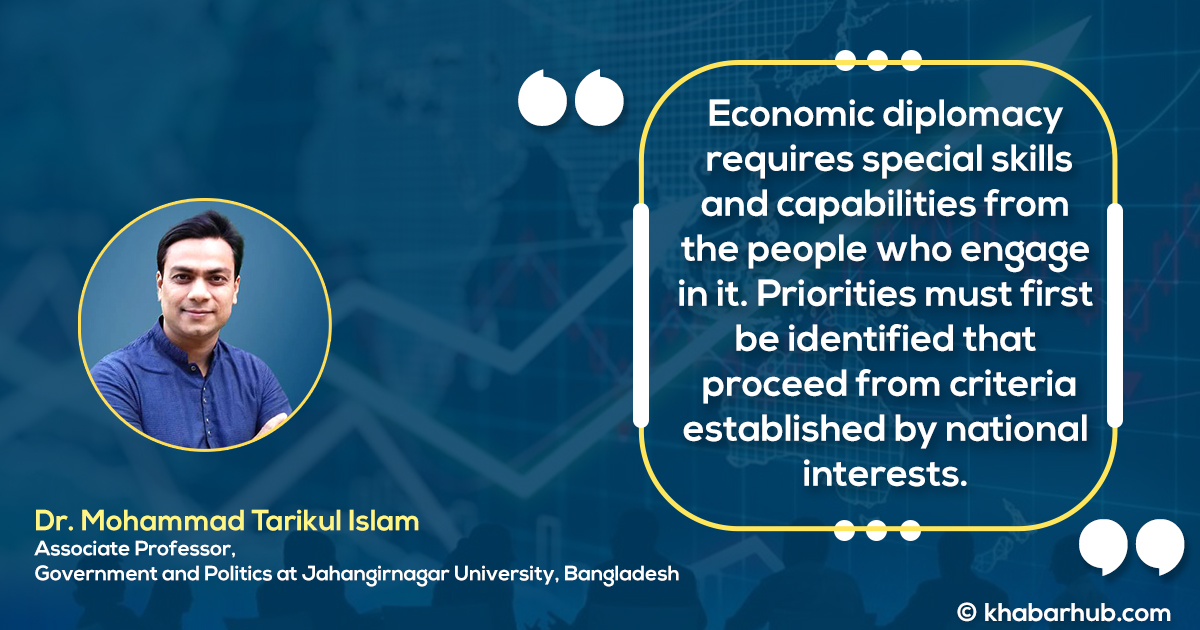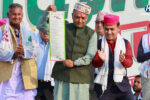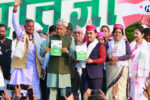Diplomacy is motivated by interests, while economic diplomacy, correspondingly, by economic interests.
Since it is precisely these interests that form the framework within which contemporary international relations are structured, economic diplomacy is becoming particularly pertinent in carrying out research studies and elaborating rational policy.
It is perceived as the decision-making, policy-making and advocating device of the state-business interests towards the outside world.
Diplomacy like politics is the art of the possible that is the ability to construct arguments and implement practical measures in a way that yields maximum remuneration.
But the remuneration, in this case, can only be expressed in the realization of interests, be they tactical or strategic, short-term or long-term, local or systemic.
Economic diplomacy is concerned with economic policy issues, e.g. work of delegations at standard-setting organizations such as the World Trade Organization.
Economic diplomacy must be carried out concerning all areas and vectors of international economic relations since national economic interests reflect the reproduction process in which all the economic entities are involved.
Economic diplomats also monitor and report on economic policies in foreign countries and give the home government advice on how to best influence them.
Economic diplomacy employs economic resources, either as rewards or sanctions, in pursuit of a particular foreign policy objective.
This is sometimes called “economic statecraft. Economic diplomacy is functional at three levels: Bilateral, regional, and multilateral. Bilateral economic diplomacy plays a major role in economic relations.
It includes bilateral trade and treaty; investment agreements; employment or avoidance of double taxation; and a range of formal and informal economic issues between two countries.
Bilateral Free Trade Agreements have been the order of the day, and is being implemented by many countries around the world.
With ever-expanding economic globalization and associated complexities, economic diplomacy has become an intrinsic part and determinant of the process of formulating and implementing a country’s foreign policy.
A significant result of the evolution of traditional trade diplomacy into economic diplomacy is that the private sector and the civil society are now even more involved in decision making that influences the negotiating position of a country.
While private sector involvement stems from the need to remain competitive in relevant markets, the involvement of the civil society results from the imperative to get views of common stakeholders factored into negotiating positions to conquer the position with their concerns, and thus both engagements result in wider national ownership.
Nonetheless, economic diplomacy requires special skills and capabilities from the people who engage in it. Priorities must first be identified that proceed from criteria established by national interests.
In this respect, both the economic and the political and socio-cultural contexts of common interests are very important.
By reinforcing the instruments of traditional diplomatic work with economic factors, economic diplomacy promotes a more profitable solution to promote the concept of sustainable development.
At the beginning of the 21st century, ideological contradictions in relations among states have been receding into the background, while the role of the economic component in foreign policy is increasingly rising.
Diplomacy is being made economic by countries taking a more active part in the international division of labor and by greater integration of their national economies in the world economy in the context of globalization.
Globalization has augmented the importance of economic interdependence among countries. The emergence of an expanding rules-based global trading system under the World Trade Organization and bilateral/regional trade agreements has opened the door for new opportunities in the sphere of world trade.
This has spurred countries into engaging in negotiating a large number of international agreements through bilateral, regional and multilateral fora.
These negotiations have generated the need for a better understanding of the science and skills of economic diplomacy. Such efforts bring a change towards the entire process of the development struggles of the nation at the end.
Economic diplomacy is a major theme of the external relations of virtually all countries.
At home, economic ministries, trade and investment promotion bodies, chambers of commerce, and of course foreign ministries, are all participants in economic work.
Current trends include increasing collaboration between state and non-official agencies, and increased importance given to WTO issues, the negotiation of free trade and preferential trade agreements, and accords covering investments, double taxation avoidance, financial services and the like.
Abroad, embassies, consulates, and trade offices handle economic diplomacy. The main focus is on promotion, to attract foreign business, investments, technology and tourists.
Economic diplomacy connects closely with political, public and other segments of diplomatic work to figure out the appropriate path for expanding the idea of global partnership to attain SDGs.
Without a doubt, it is shown that the core value of the foreign policy aims is to rest with the survival of the state and its citizens.
The development of economic diplomacy and the ways it is carried out can be traced based on the example of different countries.
Economic diplomacy must be carried out concerning all areas and vectors of international economic relations since national economic interests reflect the reproduction process in which all the economic entities are involved.
So it is legitimate to subdivide the diversity of economic diplomacy tasks into two levels of implementation—macro- and microeconomic.
Whereas microeconomic diplomacy implies support of certain enterprises, the macroeconomic level covers questions of analytical elaboration and defense of the national position (interest) when resolving problems relating to the integration of the country’s economy into the world economy and is concentrated on the interaction among national economic systems.
In this context, it is very important to, first, present economic diplomacy with scientifically substantiated, rather than imaginary objectives that could ultimately lead to severe losses and, second, anticipate events that could pose threats to the realization of national economic interests from the outside.
The process of globalization and technology has drawn the attentiveness of developing countries and for which the nation-states are engaged in fierce competition for economic gains and at the same time seek cooperation with other like-minded states to mold regulatory institutions in their favor.
Countries also compete with each other to attract foreign direct investment, push other countries to gain market access for their national companies and attempt to protect their domestic markets by covert or overt trade barriers.
Economic Diplomacy for developing countries is guided by promotion and protection of the national interest; promotion of regional integration in adherence to the UN values; promotion of international cooperation for the consolidation of universal peace and mutual respect among all nations and elimination in all its manifestations and respect for international law and treaty obligations as well as the seeking of the settlement of international disputes by negotiation, mediation, conciliation, arbitration and adjudication.
Moreover, sustainable development is the core principle of economic diplomacy and it has been the demand of time in the wake of the COVID-19 pandemic.
Today amid the COVID-19 pandemic, we should talk about the new strategies of developing countries’ economic diplomacy from the viewpoint of finding a balance of interests that can be reached where the objectives of individual states or their economic integration intersect, and not from the perspective of pressure or discrimination.
Economic diplomacy is the art of serving the economic security and strategic interests of the country by the use of the economic instrument in the conduct of State to State relations.
In economic diplomacy, it is important to find factors that will yield the greatest payoff both today and tomorrow, in the short term and in the long term.
The development of economic diplomacy and the ways it is carried out can be traced based on the example of different countries.
Every country has its approach to understanding economic interests and economic diplomacy for the greater interest of the nationhood.
While some countries proceed from historical factors in the description of these interests and political-diplomatic methods of achieving them, others rely on ideological imperatives, while still others are aimed at pragmatics.
This implies pragmatic goals of preserving or achieving leadership, protecting the country’s sovereignty and territorial integrity, carrying out reforms, and ensuring sustainable development.
The last alternative appears to be the most effective, where the main postulates of diplomacy, and foreign policy as a whole, are not dogmas of precepts advanced by theological imperatives, but an increase in national production and standard of living.
The people’s real interests and the economic means for achieving them can be institutionalized in civil society, as well as with the help of democratic regulations.
In this way, prerequisites of sociopolitical stability in the country and national consent are acquired, and, in the end, the possibility of independently solving both internal political, economic, and social tasks and realizing national interests on the international arena.
The need for placing greater emphasis on economic diplomacy is now universally recognized. Politics no longer drives economics.
Economics must drive politics. Economic considerations must remain at the forefront of efforts to achieve foreign policy goals.
A road map must be devised so that diplomats are better equipped with state-level information including investment opportunities and tourism-related details.
Countries have been slower in recognizing this than others have been disadvantaged. India sadly seems to belong to the former category in comparison with some of the other major actors on the global scene today.
Economic diplomacy is the art of serving the economic security and strategic interests of the country by the use of the economic instrument in the conduct of State to State relations.
There is nothing new or unethical about it. Economic diplomacy is designed to influence policy and regulatory decisions of foreign governments as well as those of international organizations.
It goes beyond trade and investment to the resolution of multiple causes of international conflicts.
Economic diplomacy is necessarily performed by the official representatives of the State but with the changing scenario today the private sector has an important role to play and function to perform in its successful implementation.
For the success of economic diplomacy developing countries, particularly South Asian countries have to ensure steady growth of trade, technology and investment flows.
Developing countries should improve their communications link, both physical and cultural, with the regional organizations, by consciously involving themselves in building roads, highways, airlines, promoting travel and tourism.
In many developing countries there is a need to give greater weight to economics in induction training in the diplomatic services, as well as more, high-quality mid-career training programs for officials from the foreign ministry and its economic counterparts.
Training with the corporate sector be given more importance and the Heads of Missions also need to undertake special training to enable them not only to supervise the economic work in their missions but also to take a direct interest themselves in such work.
Knowledge of the fundamental principles and methods of economic diplomacy is pertinent not only for diplomats as such.
It is important to strengthen the diplomat’s connectivity with its own countries.
A road map must be devised so that diplomats are better equipped with state-level information including investment opportunities and tourism-related details.
Emphasis right from the beginning should be on the importance of networking with the public and private sector, academic institutions, etc.
Training with the corporate sector be given more importance and the Heads of Missions also need to undertake special training to enable them not only to supervise the economic work in their missions but also to take a direct interest themselves in such work.
There should be greater reliance on local talent, particularly at junior levels, in the commercial wings of the missions.
Combining foreign affairs and foreign trade is a powerful device to lay the foundation in realizing national interests.
Lastly, foreign ministries need to build economic skills into their diplomatic networks and to open themselves to the economic partners, with exchanges of personnel.
Economic management systems can benefit from mutual learning, analyzing the best practice models.
(Dr. Mohammad Tarikul Islam is an Associate Professor of the Department of Government and Politics at Jahangirnagar University in Bangladesh. He is the Visiting Scholar of Oxford and Cambridge. Prior to joining the university, Dr. Islam was serving the United Nations for seven years)








Comment